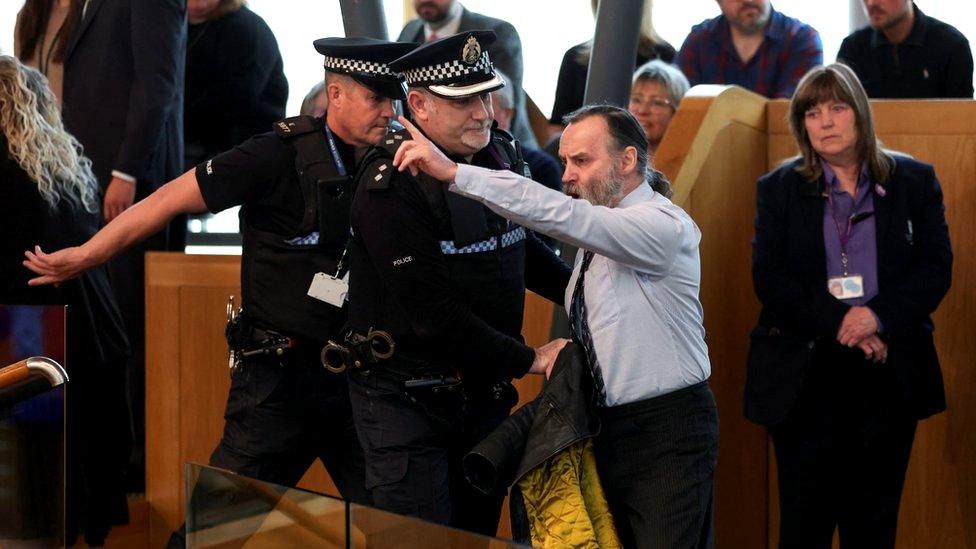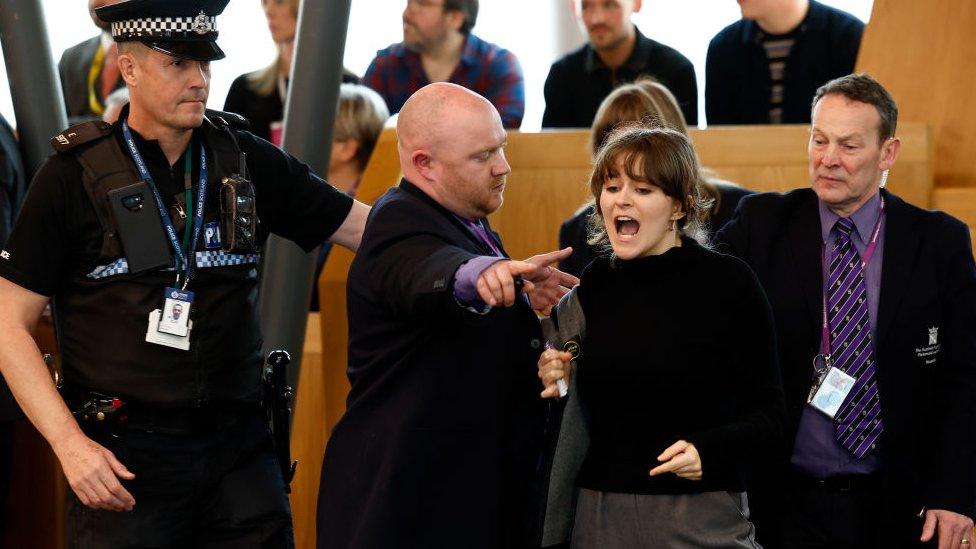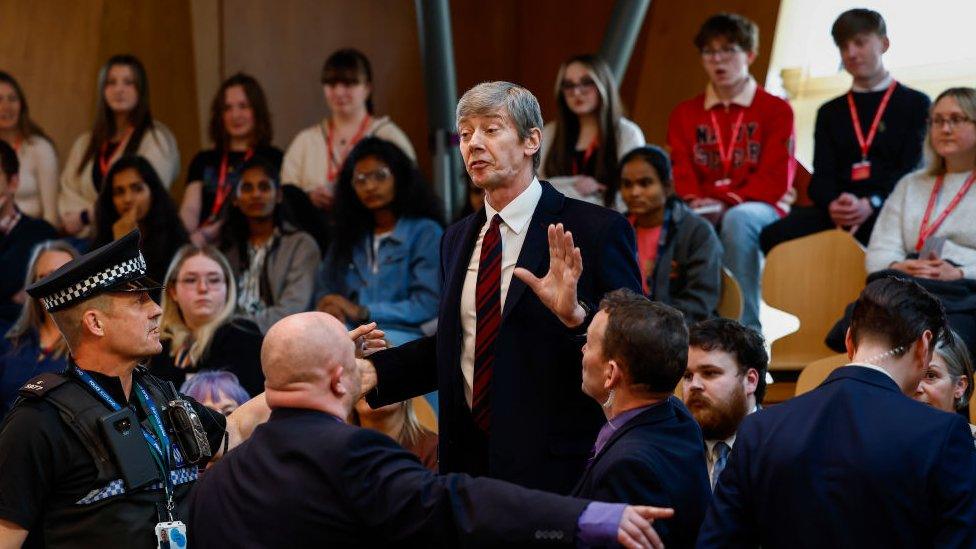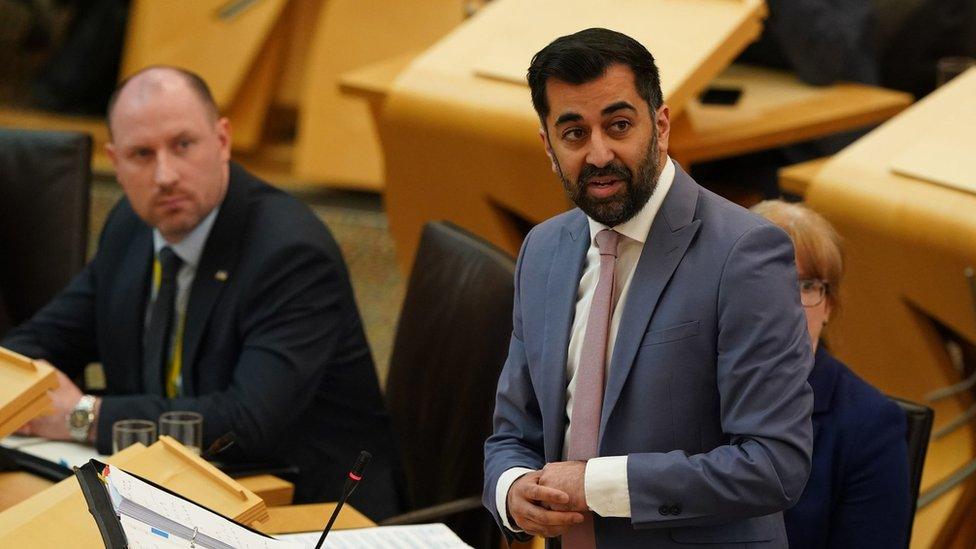Humza Yousaf's first FMQs hit by series of disruptions
- Published
Climate change protests disrupt Humza Yousaf's first session of first minister's questions
Eleven protesters who disrupted Humza Yousaf's First Minister's Questions (FMQs) debut face a six-month ban from parliament's public gallery.
Mr Yousaf's first FMQs session was hit by a series of disruptions from climate activists.
The public gallery in the Holyrood chamber was eventually cleared after the session had to be suspended five times in the first 15 minutes.
The presiding officer later announced tougher action against the protesters.
Police later confirmed that 11 people had been removed from the public gallery but no-one was arrested.
Such interruptions have been an almost weekly occurrence during recent FMQs.
Presiding Officer Alison Johnstone has pledged to take action to stop them, with mobile phones already having been banned in the gallery.
She later said there would be "more stringent measures" to identify those responsible, and a change to the parliament's visitor policy which would ban those individuals from the public gallery for six months.
The first suspension of proceedings came before Scottish Conservative leader Douglas Ross had even managed to ask his first question to Mr Yousaf, who was sworn in as Nicola Sturgeon's successor as first minister on Wednesday.
There were then a series of further interruptions during Mr Ross's exchanges with Mr Yousaf, with the presiding officer eventually calling on police and court officials to remove the public from the gallery.
Ms Johnstone said: "I don't think I can adequately express my deep regret that such action is required in our national parliament.
"I'm extremely sorry for the overwhelming majority of those who have travelled to the parliament today to watch their elected representatives at work."



Police officers cleared the public gallery after a series of interruptions
After one group of schoolchildren was allowed to remain in the gallery, SNP MSP Stuart McMillan asked that another school group from his constituency also be allowed to return - prompting a further suspension.
Mr Yousaf told the presiding officer he agreed with her decision to clear the gallery, and praised the school pupils for "behaving much better than some of the adults that were in the public gallery".
Mr Ross blasted the protesters, saying: "This shower have been doing this week after week, and the image of genuine constituents being forced out of our parliament is one we will all regret and one none of us want to see repeated."
He said he was grateful that schoolchildren had been permitted to remain, but added: "We must do something to stop this going forward."


Protests have become a regular feature of FMQs in recent months, but today might have been a new record with FIVE inside the first set of questions.
Presiding Officer Alison Johnstone told MSPs that there are plans to try to crack down on this.
But they chiefly consist of banning the use of mobile phones in the chamber and it is not clear if they will have a decisive effect.
Indeed given the protests consist entirely of people shouting, it's difficult to think of a foolproof method to actually prevent them.
The public gallery has been cleared for today.
The absolute last resort would be to bar people from sitting there at all - something which the parliamentary authorities will be loathe to consider, given that transparent scrutiny is the whole point of Holyrood.

The session followed three days of ceremony and procedure since Mr Yousaf's election as SNP leader on Monday.
He won the backing of the majority of MSPs to become first minister on Tuesday before being sworn in at the Court of Session on Wednesday.
He has named a nine-strong cabinet team, with his new deputy Shona Robison taking over the finance brief from Kate Forbes. Six of the nine cabinet members are women and there are five members under 40.
Ms Forbes, who was narrowly defeated by Mr Yousaf in the leadership contest, turned down a move from finance secretary to rural affairs - which would generally be seen as a demotion - and is now sitting as a backbench MSP.
Mr Yousaf's appointments came under fire from Mr Ross, who described his team as a "cabinet of lackeys".
Mr Ross pointed out that key ministerial posts relating to tourism and social security were abolished while Mr Yousaf had appointed a new minister for independence.
"It's the same old from the SNP, another nationalist leader, when Scotland needs a national leader," he told the chamber.
And he questioned whether having a minister for independence was a priority for the people of Scotland.

Mr Yousaf has been criticised by some within his own party over his choice of cabinet members
Mr Yousaf said he made no apology for having a minister focused on independence, saying it was now more important than ever for Scotland to leave the UK.
In his question to Mr Yousaf, Scottish Labour leader Anas Sarwar focused on Scotland's mental health crisis, saying that more than 11,000 children and young people waited more than the 18-week standard and over 14,000 had referrals rejected entirely.
Mr Yousaf said Mr Sarwar did not acknowledge the global impact of the Covid pandemic, but offered an apology and "deep regret" for anyone who had to wait longer than they should.
He added that the Scottish government was taking action on recovery and the number of children starting treatment in the most recent quarter was the highest figure on record.
The first minister said the overall mental health treatment waiting lists for young people had decreased by about 777, while the number of children waiting more than 18 weeks had dropped by 1,110.
He added that there had been a 41.9% drop in the number waiting more than 52 weeks.